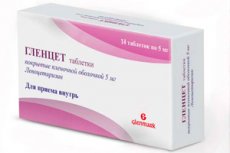該文的醫學專家
新出版物
格伦塞斯
阿列克谢·克里文科,医学审稿人
最近審查:04.07.2025
最近審查:04.07.2025

Glencet 含有活性成分左西替利嗪,是第二代抗组胺药,用于治疗过敏性鼻炎和慢性特发性荨麻疹的症状。左西替利嗪作为 H1 组胺受体阻滞剂,可有效减轻瘙痒、流鼻涕和眼刺激等过敏症状。
临床数据显示,左西替利嗪在治疗过敏性疾病方面表现出较高的疗效和良好的耐受性。它起效迅速,药效持续时间长,方便过敏患者使用(Grant 等人,2002 年)。此外,左西替利嗪还可用于伴有瘙痒的皮肤病(例如湿疹)的综合治疗,并显著改善患者的主观感觉和客观症状(Murashkin 等人,2011 年)。
这些特性使 Glencet 成为缓解过敏反应和相关皮肤病症状的重要药物。
適應症 Glencetha
- 过敏性鼻炎(季节性和全年性),伴有鼻塞、流鼻涕、瘙痒和打喷嚏。
- 荨麻疹(建议使用皮质类固醇作为严重荨麻疹的辅助治疗)。
- 过敏性结膜炎(季节性和全年性),伴有结膜瘙痒、流泪、发红和肿胀。
發布表單
Glencet 通常以口服片剂形式提供。
藥效學
作用机制:
- 左西替利嗪是西替利嗪的活性代谢物,是第二代抗组胺药。
- 它阻断细胞表面的 H1 组胺受体,从而阻止组胺的作用。
- 组胺是人体在过敏反应中释放的一种物质。在组胺的作用下,血管扩张,毛细血管通透性增加,从而出现过敏症状。
藥代動力學
- 吸收:左西替利嗪口服后一般经胃肠道良好吸收,血浆峰浓度通常在给药后1-2小时达到。
- 代谢:左西替利嗪几乎不经肝脏代谢,几乎不发生药物变化。这使得其在长期使用过程中能够保持其药代动力学特性。
- 排泄:左西替利嗪主要经尿液排泄。尿液排泄率约为85%且无变化。
- 消除半衰期:左西替利嗪在体内的消除半衰期约为5-9小时。这意味着该药物可以每天服用一次,以确保稳定的血药浓度。
- 食物的影响:食物摄入不会显著影响左西替利嗪的吸收或代谢,因此服用该药物时无需考虑食物摄入量。
- 与其他药物的相互作用:左西替利嗪通常耐受性良好,与其他药物发生相互作用的可能性较低。然而,当与可能对中枢神经系统有镇静作用的药物同时服用时,建议谨慎,以免增强镇静作用。
劑量和管理
使用方法:
- Glencet 通常采用口服方式,即通过口腔服用。
- 应使用少量水将药片整片吞服。
- 无论是否进食都可以服用该药物。
剂量:
- Glencet 的剂量可能因患者的年龄、过敏症状的严重程度和医生的建议而异。
- 成人和 12 岁及以上儿童的常用剂量为每天 1 片(5 毫克左西替利嗪)。
- 对于6至12岁的儿童,通常建议服用成人剂量的一半,即每天一次,每次2.5毫克(半片)。
入院时长:
- Glencet 治疗的持续时间通常由医生决定,取决于过敏症状的性质和严重程度。
- 通常服用药物直到症状完全缓解或按照医生的处方服用。
在懷孕期間使用 Glencetha
由于安全性数据有限,孕期使用左西替利嗪(Glencet)应谨慎。左西替利嗪是西替利嗪的活性对映体,与许多其他抗组胺药一样,孕期使用左西替利嗪需要仔细的风险-效益评估。
研究表明,妊娠期间使用左西替利嗪不会显著增加出生缺陷或其他不良后果的风险,但缺乏数据和潜在风险值得关注。因此,建议避免在妊娠期间使用左西替利嗪,尤其是在胎儿器官发育的妊娠早期,并且仅在严格适应症和医生监督下使用。
对于需要治疗过敏性疾病的孕妇,应考虑在孕期安全性更可靠的替代疗法。孕期开始任何治疗前,请务必咨询医生。
禁忌
- 超敏反应:已知对左西替利嗪或该药物的任何成分超敏反应的人不应服用 Glencet。
- 怀孕和哺乳:关于怀孕和哺乳期间使用左西替利嗪的安全性的信息有限,因此在此期间使用左西替利嗪应仅在医生的建议下进行。
- 儿科:某些剂型的左西替利嗪不建议特定年龄段以下的儿童在未咨询医生的情况下使用。对于儿童,最好使用专为儿童设计的剂型。
- 肝功能损害:严重肝功能损害的患者应避免使用左西替利嗪或在医生监督下谨慎使用。
- 肾脏疾病:如果存在严重的肾功能损害,可能需要在医生的监督下调整左西替利嗪的剂量或停药。
- 与其他中枢作用药物一起使用:左西替利嗪可能会增加中枢神经系统抑制,因此对于服用其他影响中枢神经系统的药物(如镇静剂或酒精)的患者应谨慎使用。
副作用 Glencetha
- 困倦或疲劳。
- 头晕。
- 头痛。
- 口干。
- 腹痛或腹泻。
- 流鼻涕。
過量
- 困倦或疲劳。
- 头晕或站立不稳。
- 口干。
- 头痛。
- 心率加快(心动过速)。
- 血压升高。
- 罕见的是,可能会出现更严重的症状,如呼吸困难、癫痫或昏迷。
與其他藥物的相互作用
- 中枢作用药物:左西替利嗪可能会增强其他中枢作用药物(如催眠药、抗焦虑药和抗抑郁药)的镇静作用。这可能会增加嗜睡和昏睡等不良反应的风险。
- 酒精:服用左西替利嗪时饮酒可能会增强其镇静作用,导致嗜睡和昏睡感增加。
- 经细胞色素 P450 3A4 代谢的药物:左西替利嗪对细胞色素 P450 3A4 酶的活性影响不显著,但某些经该酶代谢的药物可能会影响左西替利嗪的代谢。例如,酮康唑等细胞色素 P450 3A4 抑制剂可能会升高左西替利嗪的血药浓度。
- 增加胃肠道 pH 值的药物:增加胃肠道 pH 值的药物(例如抗酸剂)可能会降低左西替利嗪从胃肠道吸收的速度和程度。
注意!
為了簡化對信息的理解,本指令使用了藥物 "格伦塞斯",並根據藥物的醫療用途官方說明。 使用前請閱讀直接用於藥物的註釋。
描述僅供參考,不適用於自我修復指導。 這種藥物的需求,治療方案的目的,藥物的方法和劑量僅由主治醫師確定。 自我藥療對你的健康有危害。


